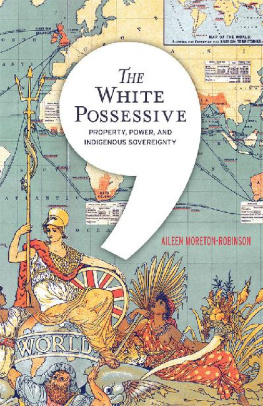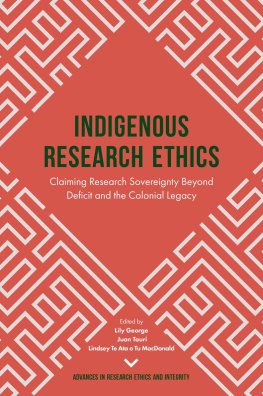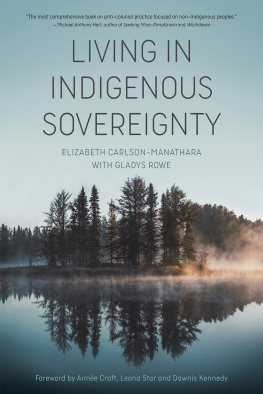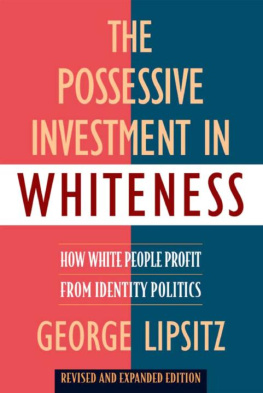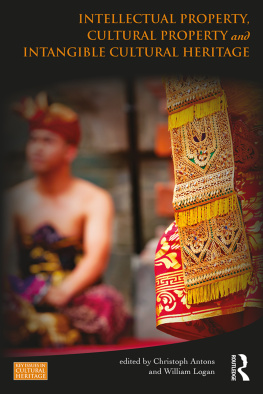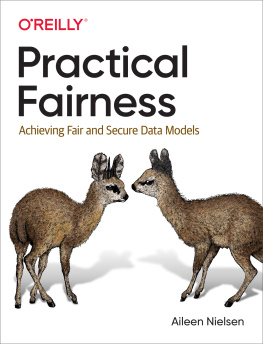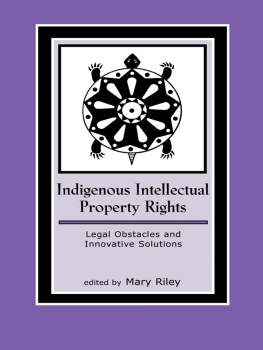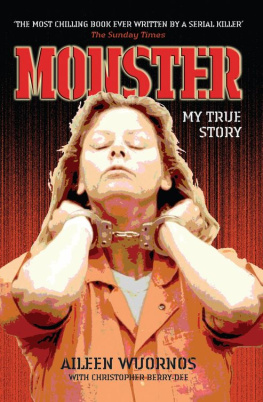The White Possessive
Indigenous Americas
Robert Warrior, Series Editor
Chadwick Allen, Trans-Indigenous: Methodologies for Global Native Literary Studies
Raymond D. Austin, Navajo Courts and Navajo Common Law: A Tradition of Tribal Self-Governance
Lisa Brooks, The Common Pot: The Recovery of Native Space in the Northeast
Kevin Bruyneel, The Third Space of Sovereignty: The Postcolonial Politics of U.S.Indigenous Relations
Glen Sean Coulthard, Red Skin, White Masks: Rejecting the Colonial Politics of Recognition
James H. Cox, The Red Land to the South: American Indian Writers and Indigenous Mexico
Brendan Hokowhitu and Vijay Devadas, The Fourth Eye: Ma ori Media in Aotearoa New Zealand
Daniel Heath Justice, Our Fire Survives the Storm: A Cherokee Literary History
Thomas King, The Truth about Stories: A Native Narrative
Scott Richard Lyons, X-Marks: Native Signatures of Assent
Aileen Moreton-Robinson, The White Possessive: Property, Power, and Indigenous Sovereignty
Jean M. OBrien, Firsting and Lasting: Writing Indians Out of Existence in New England
Paul Chaat Smith, Everything You Know about Indians Is Wrong
Lisa Tatonetti, The Queerness of Native American Literature
Gerald Vizenor, Bear Island: The War at Sugar Point
Robert Warrior, The People and the Word: Reading Native Nonfiction
Robert A. Williams Jr., Like a Loaded Weapon: The Rehnquist Court, Indian Rights, and the Legal History of Racism in America
The White Possessive
Property, Power, and Indigenous Sovereignty
Aileen Moreton-Robinson
Indigenous Americas
University of Minnesota Press
Minneapolis | London
See pages 22324 for information on previous publications.
Copyright 2015 by the Regents of the University of Minnesota
All rights reserved. No part of this publication may be reproduced, stored in a retrieval system, or transmitted, in any form or by any means, electronic, mechanical, photocopying, recording, or otherwise, without the prior written permission of the publisher.
Published by the University of Minnesota Press
111 Third Avenue South, Suite 290
Minneapolis, MN 55401-2520
http://www.upress.umn.edu
Library of Congress Cataloging-in-Publication Data
Moreton-Robinson, Aileen.
The white possessive : property, power, and indigenous sovereignty / Aileen Moreton-Robinson. (Indigenous Americas)
Includes bibliographical references and index.
ISBN 978-1-4529-4459-3
1. Aboriginal AustraliansEthnic identity. 2. Aboriginal AustraliansLand tenure. 3. WhitesRace identityAustralia. 4. PropertySocial aspectsAustralia. 5. Self-determination, NationalAustralia. 6. Race awarenessAustralia. 7. AustraliaRace relations. 8. National characteristics, Australian. I. Title.
DU124.E74M67 2015
333.30994dc23
2014028050
The University of Minnesota is an equal-opportunity educator and employer.
For those who have passed this life
my mum Joan Moreton, Uncle Dennis, Aunty Shirley, Sister Glenis, and my son Cameron.
Your dignity and love always made a difference.
Contents
Acknowledgments
Introduction: White Possession and Indigenous Sovereignty Matters
I. Owning Property
1. I Still Call Australia Home: Indigenous Belonging and Place in a Postcolonizing Society
2. The House That Jack Built: Britishness and White Possession
3. Bodies That Matter on the Beach
4. Writing Off Treaties: Possession in the U.S. Critical Whiteness Literature
II. Becoming Propertyless
5. Nullifying Native Title: A Possessive Investment in Whiteness
6. The High Court and the Yorta Yorta Decision
7. Leesas Story: White Possession in the Workplace
8. The Legacy of Cooks Choice
III. Being Property
9. Toward a New Research Agenda: Foucault, Whiteness, and Sovereignty
10. Writing Off Sovereignty: The Discourse of Security and Patriarchal White Sovereignty
11. Imagining the Good Indigenous Citizen: Race War and the Pathology of White Sovereignty
12. Virtuous Racial States: White Sovereignty and the UN Declaration on the Rights of Indigenous Peoples
Afterword
Notes
Publication History
Index
Acknowledgments
As an Aboriginal girl growing up on Minjerribah (Stradbroke Island), the size of the world was hard to imagine, though glimpses of its magnitude were available in the collection of National Geographic magazines in the school library. The world now seems a great deal smaller, and I have been very fortunate to have met and worked with many wonderful people. I want to thank Deborah Madsen at the University of Geneva, who first encouraged me to consider publishing a collection of my work. Thanks especially to Robert Warrior at the University of Illinois for the kindness and generosity he extended to me in supporting my endeavors to make the book become a reality. His intellectual warrior-ship inspires and influences those of us fortunate enough to know him as a friend and a brother. I also would like to extend thanks to the following scholars for your friendship and collegiality: Sara Ahmed, Chris Andersen, Larissa Behrendt, Vince Diaz, Pat Dudgeon, Bronwyn Fredericks, Mishauana Goeman, David Theo Goldberg, Cheryl Harris, Daniel Heath-Justice, Brendan Hokowhitu, LeAnne Howe, Trish Lukas, Alissa Macoun, John Maynard, Mark McMillan, Toula Nicolacopoulos, Fiona Nicoll, Jacki Thompson Rand, Daryle Rigney, Lester Irabinna Rigney, Audra Simpson, David Singh, Kim TallBear, Jacki Troy, and George Vassilacopoulos. All of you, in one way or another, continue to shape and stretch my thinking in productive ways.
My appreciation and thanks extends to my staff at the Queensland University of Technology for your hard work and support, which made it easier to complete this book.
I am especially grateful to Jason Weidemann at the University of Minnesota Press for his magnanimous support and the reviewers for their generous and helpful comments.
I acknowledge my extended family, who are too numerous to mention, and honor the ancestors and elders of Quandamooka . To Paul and Angela Leitch, thank you for giving bucketloads of love and friendship to weather many a storm. I cannot thank enough the most important people who, every day, make my living and working possible. My love and thanks to my partner Ian, my children Rhiannon and Adam, and my grandchildren Mamindah, Grace, Lucy, and CharlieI am truly blessed.
Introduction
White Possession and Indigenous Sovereignty Matters
The problem with white people is they think and behave like they own everything.
Dennis Benjamin Moreton (personal communication, April 10, 2005)
I T SEEMS APT TO BEGIN WITH A QUOTE from my recently departed Gami (uncle) because he was a humble, kind, and wise man. Gamis words succinctly encapsulate what I am striving to reveal in this book. While writing this introduction, race as a socially constructed phenomenon is busy doing its work within Australia, measuring Aboriginality by the shade of skin color. It is as though race travels back and forth in time to show us its indeterminacy, seductively enticing us to commit ourselves to its truths. We know not its origins, as a form of exclusion, though there is some consensus that the manifestation of race, conceptualized as having biological form, emerged in the seventeenth century, occurring simultaneously with the rise of liberal democracy. Indigenous peoples did not produce this history, but the conditions under which we live shape our experiences of how well race and state operate in tandem to condition each other. It takes a great deal of work to maintain Canada, the United States, Hawaii, New Zealand, and Australia as white possessions. The regulatory mechanisms of these nation-states are extremely busy reaffirming and reproducing this possessiveness through a process of perpetual Indigenous dispossession, ranging from the refusal of Indigenous sovereignty to overregulated piecemeal concessions. However, as this book will reveal, it is not the only way the possessive logics of patriarchal white sovereignty are operationalized, deployed, and affirmed. I use the concept possessive logics to denote a mode of rationalization, rather than a set of positions that produce a more or less inevitable answer, that is underpinned by an excessive desire to invest in reproducing and reaffirming the nation-states ownership, control, and domination. As such, white possessive logics are operationalized within discourses to circulate sets of meanings about ownership of the nation, as part of commonsense knowledge, decision making, and socially produced conventions.


